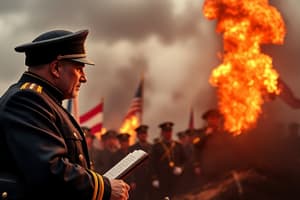Podcast
Questions and Answers
What event marked the beginning of World War II?
What event marked the beginning of World War II?
The invasion of Poland by Germany on September 1, 1939
What were the roots of World War II?
What were the roots of World War II?
The Treaty of Versailles following World War I
What political party rose to power in Germany prior to World War II?
What political party rose to power in Germany prior to World War II?
Adolf Hitler's Nazi Party
What policy did British Prime Minister Neville Chamberlain pursue in response to German aggression?
What policy did British Prime Minister Neville Chamberlain pursue in response to German aggression?
What was the period between September 1939 and May 1940 known as?
What was the period between September 1939 and May 1940 known as?
When did German forces invade Belgium, Luxembourg, and the Netherlands?
When did German forces invade Belgium, Luxembourg, and the Netherlands?
What was the outcome of the Battle of Britain?
What was the outcome of the Battle of Britain?
Who became the first joint chairman of the Combined Chiefs of Staff after America entered the war?
Who became the first joint chairman of the Combined Chiefs of Staff after America entered the war?
When did D-Day, the largest seaborne invasion in history, take place?
When did D-Day, the largest seaborne invasion in history, take place?
When did Nazi Germany surrender unconditionally to the Allies?
When did Nazi Germany surrender unconditionally to the Allies?
Flashcards are hidden until you start studying
Study Notes
World War II was a global conflict that lasted from 1939 until 1945. It is generally considered to have begun with the invasion of Poland by Germany on September 1, 1939. This marked the start of an era of total warfare in Europe and beyond, which involved all aspects of societies and economies.
Background and Causes
The roots of World War II can be traced back to the Treaty of Versailles following World War I, which imposed harsh penalties on Germany, exacerbating social and economic issues within the country. In the years leading up to the war, Adolf Hitler's Nazi Party rose to power in Germany, fueled by anti-Semitic hatred and aggressive expansionist policies. As tensions grew between major European powers, particularly Germany and Great Britain, many countries began to rearm and form military alliances.
Appeasement Policy
In the face of increasing aggression from Germany and Italy under Benito Mussolini, British Prime Minister Neville Chamberlain pursued a policy of appeasement, hoping to avoid a war through diplomacy and concessions. This approach, however, failed to deter Hitler, who continued to expand his empire through invasions and annexations.
The Phoney War
Between the start of the war in September 1939 and the German invasion of France in May 1940, the period was known as the "Phoney War" or the "Sitzkrieg" (sitting war). Despite this relative calm, both sides were preparing for full-scale warfare.
Major Events and Conflicts
World War II was characterized by several significant events and conflicts across multiple fronts:
Invasion of France and the Low Countries
On May 10, 1940, German forces invaded Belgium, Luxembourg, and the Netherlands, followed by an attack on France two days later. Despite initial French successes, the Allied defense deteriorated rapidly due to logistical weaknesses and overextension. By June 1940, much of Western Europe had fallen to Axis control, leaving Britain isolated.
Battle of Britain
From July to October 1940, the Royal Air Force (RAF) successfully defended Britain against large-scale air raids by the German Air Force (Luftwaffe). Although the RAF suffered heavy losses, it managed to prevent a direct invasion of Britain, which would have likely led to its defeat.
Command of the Combined Chiefs of Staff
Winston Churchill became the first joint chairman of the Combined Chiefs of Staff after America entered the war. He also played a pivotal role in convincing Roosevelt to enter the war.
D-Day
D-Day, the largest seaborne invasion in history, took place on June 6, 1944. Led by the United States and Britain, the operation aimed to establish a foothold in northern France and ultimately liberate Western Europe from Nazi control. Despite heavy loss of life, the operation was successful, and the Allies were able to push towards Berlin.
Fall of Berlin
By April 1945, Soviet and American forces clashed near Torgau, Germany, signaling the end of the war in Europe. On April 30, 1945, Hitler committed suicide in his bunker in Berlin. Two days later, Nazi Germany surrendered unconditionally to the Allies, effectively ending World War II in Europe.
Aftermath and Legacy
The end of World War II led to a deep sense of relief and a desire for peace among the victors and survivors alike. However, the lasting impact of the war was far-reaching and profound. The world order established after the war fundamentally altered international relations and shaped subsequent decades. Some key outcomes included:
Emergence of Superpowers
The United States and the Soviet Union emerged as superpowers, setting the stage for the Cold War, which lasted until the collapse of the Soviet Union in 1991.
International Organizations
New organizations such as the United Nations (UN), the World Bank, and the International Monetary Fund were created to promote international cooperation and prevent future wars.
Decolonization
As European empires weakened during and after the war, many colonized territories gained their independence, leading to a wave of decolonization in Africa and Asia.
Lasting Impact
Despite these positive developments, the legacy of World War II remains complex and often controversial. The war brought unprecedented suffering and destruction, and the lessons learned continue to shape modern political discourse and actions.
Studying That Suits You
Use AI to generate personalized quizzes and flashcards to suit your learning preferences.




